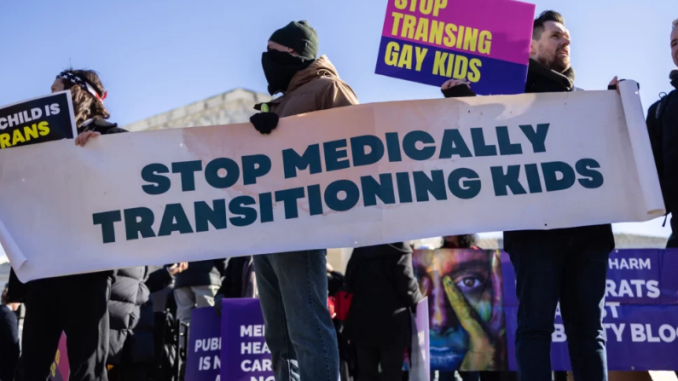
The patient suing is Clementine Breen, a 20-year-old biological woman from California who began intensive procedures aimed at helping her identify as a boy starting from the age of 12. Breen says she began to cease her testosterone treatment around the age of 17 and now claims that rushed medical interventions under Olson-Kennedy’s advice caused irreversible harm.
{snip}
The lawsuit, filed Thursday, raises questions about the ethics of transitioning minors without comprehensive psychological evaluations and could have significant implications for medical practitioners in this field. It also comes on the heels of Supreme Court arguments on Wednesday in United States v. Skrmetti, in which the Biden administration sought to preempt Tennessee from barring minors from undergoing cross-sex hormone and puberty-blocking treatments, as well as surgeries.

Allegations of rushed treatment
Breen alleges that Olson-Kennedy fast-tracked her into medical transition at the age of 12, despite a lack of clarity about her identity. After a brief school counseling session in which Breen expressed confusion about her gender and sexuality, her parents were referred to Olson-Kennedy at Children’s Hospital Los Angeles. Within three months, Breen was placed on puberty blockers. By 13, she was prescribed testosterone, and at 14, she underwent a double mastectomy.
The lawsuit furthers that Olson-Kennedy pressured Breen’s parents into consenting by warning them that Breen might die by suicide without these interventions. Breen disputes this, stating she had never expressed suicidal ideation.
{snip}
“Her voice has permanently deepened,” according to the lawsuit. “Her female body did not develop. … Her fertility is almost certainly destroyed. She would not be able to breastfeed because her healthy breasts were removed when she was only 14.”
In a short statement on X, Breen acknowledged, “Yes I am suing,” noting she could not previously discuss plans for the lawsuit.
Breen’s suit does not specify the damages she seeks but indicates she is seeking “general” and “special” damages related to medical expenses, as well as damages related to past and future “pain and suffering” and the costs of the litigation.
A controversial figure in the transgender youth advocacy movement
Olson-Kennedy is one of the most visible advocates for transgender treatments for minors, frequently quoted in the media and praised for her work. However, her approach has drawn criticism for eschewing psychological evaluations, which she has dismissed as unnecessary “gatekeeping.” In a 2018 interview, she equated prescribing puberty blockers to insulin, stating, “I don’t send someone to a therapist when I’m going to start them on insulin.”
{snip}
At least six Republican senators this week demanded greater transparency from the NIH, questioning the ethics of administering experimental treatments to minors and calling for the release of annual progress reports tied to the study.
A broader debate
Breen’s lawsuit marks a significant shift in the conversation surrounding transgender procedures in just the short span of a few years.
Critics of such treatments, including detransition activists such as Chloe Cole, have hailed the legal action as a turning point. Cole, who also underwent a transition as a minor, celebrated the news on X, writing, “Johanna Olson-Kennedy … will pay for her greed, for the destruction of so many lives.”
Supporters of transgender treatments, including parents involved in litigation to strike down Tennessee’s law, argue that these treatments are critical for the well-being of their children.
Brian Williams, the father of the 16-year-old who sued against Tennessee’s law known as Senate Bill 1, argues that other patients who have expressed positive experiences undergoing such treatments should not be preempted from undergoing procedures before the age of 18.
“We are not expecting everyone to understand everything about our family or the needs of transgender young people like our daughter,” Williams said in a statement Wednesday after the Supreme Court heard oral arguments in the case. “What we are asking for is for her freedom to be herself without fear.”
}snip}
A decision in the separate Supreme Court case is expected by June 2025, but could come earlier.

Implications for medical practice
The lawsuit could set a precedent for a heightened risk medical practitioners face if they fail to conduct thorough psychological evaluations before prescribing medical interventions.
Breen’s lawyers argue that proper mental healthcare at age 12 could have prevented her transition altogether, a claim that resonates with the growing public scrutiny of transgender procedures for minors.
As the case progresses, it will likely fuel the already contentious debate over the medicalization of gender identity in minors and could shape the future of transgender treatments for minors in the U.S.
{snip}
Olson-Kennedy and Children’s Hospital Los Angeles have not commented publicly on the lawsuit.
The Washington Examiner issued a request for comment from Olson-Kennedy and the CHLA.
